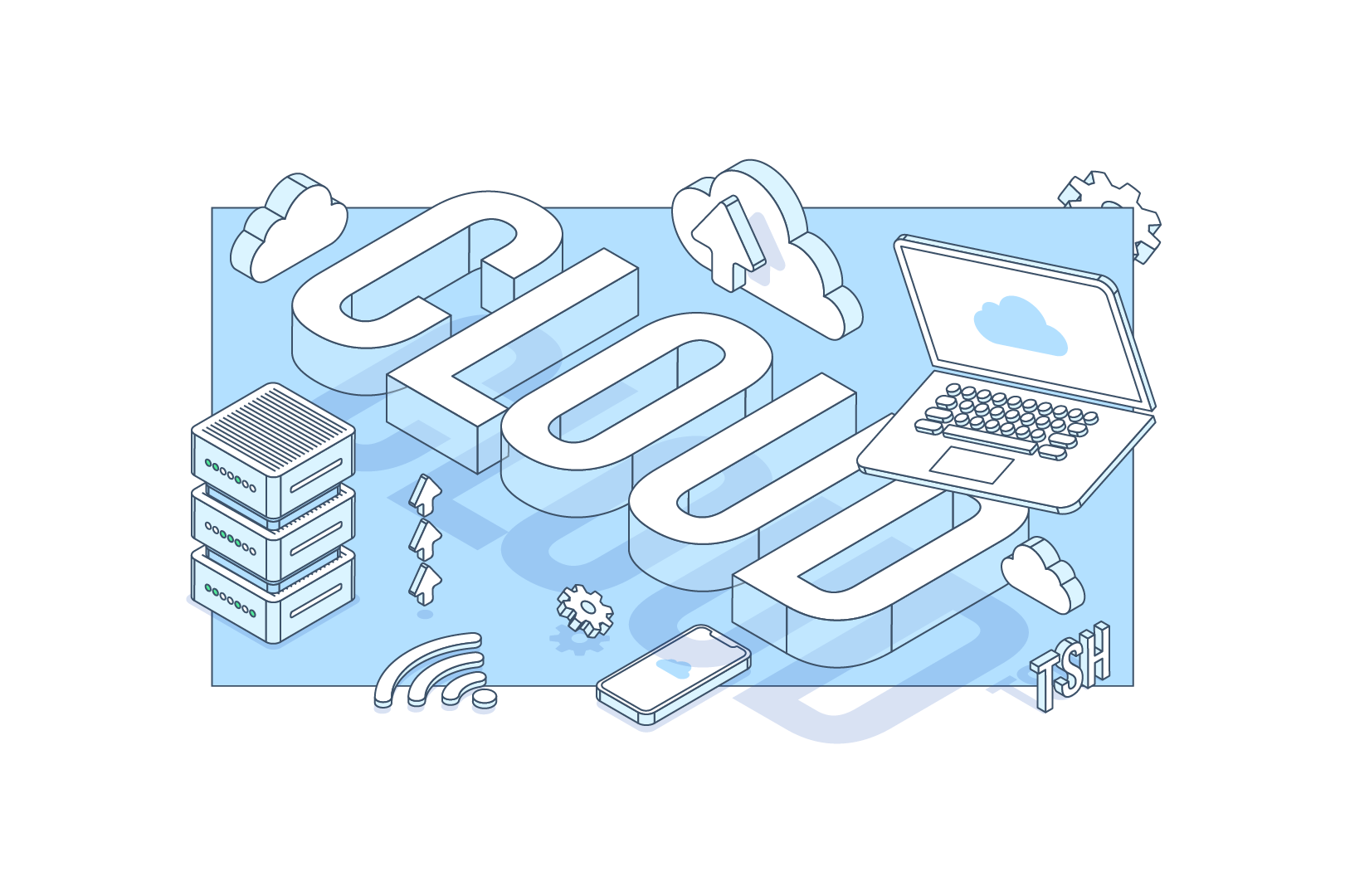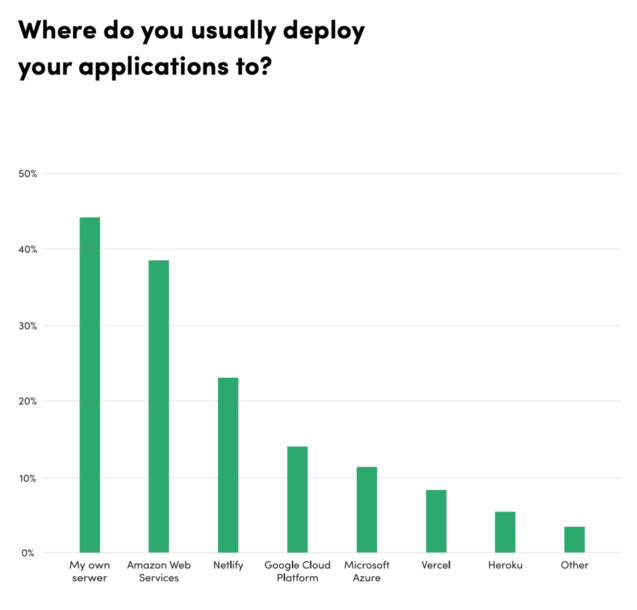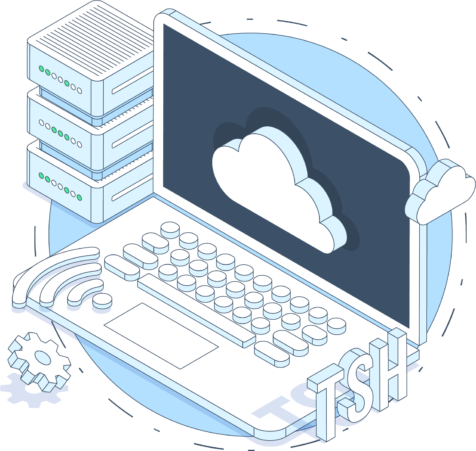05 January 2021
The different types of cloud computing services and how they influence your business

It’s been years since users moved from storing their precious data on CDs or USB sticks to keeping their stuff in the cloud. It’s no different for businesses – their data storage and computing power is being moved to the cloud as well. However, if you’re new in this field, you might be a bit overwhelmed, as there are many different types of cloud computing services to choose from. Let me show you, then, all the most important information – to help you make an educated decision about which type of cloud is good for your business.
What is cloud computing?
I have already written about the benefits of cloud computing services, so feel free to check out this article as well. But, as for now, let’s just have a quick reminder. The term “cloud computing” can be interpreted as one (or both) of these:
- Using unlimited computing resources (CPU, RAM, Disk Space) provided in the cloud,
- Setting up your application to work in the cloud environment.
Pretty simple, right? But if you’re thinking about moving to cloud and you research the options you have, you’ll probably stumble upon many different types of cloud computing. To make it simpler to understand, we can divide them into two main groups, depending on the:
- Deployment model – tells us where the infrastructure for a cloud environment is located,
- Service model – serves the various business needs of organisations.
Let us then dive deeper into both of these.
Types of cloud computing deployment models
Public cloud
Public cloud services are offered over the internet and available to all users who want to acquire them. Anybody can get a public cloud, anybody can use a public cloud, anybody can access the data in the public cloud (of course if you, as the owner, let them). Public clouds are usually big when the available space is concerned, also their infrastructure is usually spread around the world.
That means great scalability options – you can add or take away assets when you need, based on usual pay-as-you-go transactions.
Unfortunately, the entire infrastructure belongs to the public cloud provider which can cause some complications. If the cloud provider has technical problems – everybody shares them. If the cloud provider goes bankrupt – everybody has to look for another option elsewhere. If the cloud provider makes significant changes that don’t fit your business anymore – there’s no other way but bail. Finally, if the cloud provider is cyberattacked, the security problems are imposed on every user and their data. Hence, the famous leaks.
When it comes to the biggest public cloud providers (think Amazon, Google, Azure) you probably won’t have any of these technical or security problems (and if you do, it’s most likely that you or your developers messed something up) – as these providers impose the highest standards of service. However, you still might meet lots of legal issues.
In those kinds of public clouds you don’t know where your data actually is because it’s spread among thousands of servers worldwide. And that might bring a huge headache to your lawyers and investors.
So, let’s sum up the pros and the cons of the public cloud deployment model.
Benefits of public cloud: easy access from anywhere in the world, a lot of cloud storage space, scalability and pay-per-use
Disadvantages of public cloud: lack of business control, legal issues, security risks, dependency on the provider

Private cloud
Some companies decide to build their own cloud in order to have full control over the data and business. It is especially important for institutions like banks or medical organizations who are legally bound to deal with fragile data in a very careful way.
Your private cloud is fully maintained by you – so any outside-vendor problems or disruptions won’t affect your business.
However, as you can imagine, this extra control can cost way more than public clouds. And it’s not only the infrastructure – think also about the developers who need to take care of your cloud’s maintenance.
What’s more, the scalability is compromised since you can add more storage or compute capacity only physically. Not so great if you’re looking to expand your business ASAP during an occasional rise in user traffic.
Benefits of a private cloud: better control, high security
Disadvantages of a private cloud: more expensive, less scalable, requires constant maintenance
Hybrid cloud
What if you wanted a bit of both public clouds (pay-per-use scalability) and private clouds (better control over security issues)? No problem – the hybrid cloud is coming to the rescue.
The hybrid cloud deployment model is literally based on a mix of private and public clouds – so it’s possible for your data to move between the platforms. It gives you more flexibility while, at the same time, keeping the information safe and sound (with a bit of help from firewalls and encryption).
All this sounds great, but you have probably already guessed that deciding on a hybrid cloud model comes with a price. While maintaining a private cloud is definitely not a walk in the park, it’s the hybrid cloud that requires the most experienced software developers and DevOps engineers – to make sure that the private and public parts communicate as needed and there’s no problem to move data from one to the other.
Benefits of a hybrid cloud: flexibility, scalability, security – everything according to your highest standards
Disadvantages of a hybrid cloud: you need to maintain basically two clouds, which is expensive and requires top-notch specialists
Main types of cloud computing service models
Ok, we’ve found out what the possible cloud computing deployment models are. Now, let me show you the three most popular service models: infrastructure as a service, platform as a service and software as a service.
Infrastructure as a Service (IaaS)
Infrastructure as a Service is probably the most common cloud computing service model. It offers the basic infrastructure for data storage, virtualization and networking. Basically, with the IaaS model, you get a ready-to-go server, saving you time and money on buying and maintaining your own hardware. What you do with this cloud space is your call – and you’ll probably need both DevOps engineers and software developers to do that. The Infrastructure as a Service model is great for backups, monitoring, recovery, hosting.
Examples of IaaS cloud providers: Amazon Web Services (AWS), Google Compute Engine (GCE), Microsoft Azure, Cisco Metacloud.
Platform as a Service (PaaS)
Platform as a Service providers take care of infrastructure, operating system and other services needed to run your app. It means that you not only get the space in the cloud but the server is also already pre-configured – therefore, you don’t need a DevOps engineer to set up all these operating systems, databases, backups, logs, metrics, etc. You only need software developers to develop the actual software you want to have in the cloud. It all makes the Platform as a Service model a great choice for hosting your web or mobile app, as you get a platform for your devs to test, develop and deploy your software solution.
Examples of PaaS cloud providers: Amazon Web Services Elastic Beanstalk, Google App Engine, Microsoft Azure PaaS, Heroku, Oracle Cloud.
Software as a Service (SaaS)
The Software as a Service model goes one step further, offering you (and/or your clients) a fully-developed application or application suite. You don’t need to install, upgrade or in any way manage applications on your device – you just log in and go. Sometimes you can only change some basic options, for example when it comes to branding (change the interface colours, upload your company’s logo, etc.). Other times, you can set up a whole website using a simple drag and drop editor. Everything’s hosted in the cloud and is usually available through a subscription model.
Therefore, SaaS is a great choice if you need a pretty basic, default software solution. Most Software as a Service providers make it also pretty easy to collaborate on projects and share data, as they are accessible from virtually any device with an internet connection. The downside of this model is, as you might guess, quite low customizability. Also, it’s pretty hard to change SaaS vendors without substantial costs – we call it vendor lock-in.
Examples of SaaS cloud providers: Wix, Squarespace, Microsoft Office 365, Google Workspace, Dropbox, Salesforce, Adobe Creative Cloud, Cisco WebEx.

Which cloud computing types will suit your business?
Ok, we’ve learned lots of stuff today so let’s sum up the most important things, shall we?
There are three basic deployment models when it comes to cloud computing:
- Public cloud, provided by vendors like Amazon and Google, offers your cloud storage space and great scalability at a price of lacking control over security and legal issues
- Private cloud, i.e. setting up your own cloud space, means that you retain full control over your software but won’t have access to instant, limitless scalability
- Hybrid cloud is a mix of public and private clouds, and lets you benefit from both the pay-as-you-go scalability and the extended control over security issues – but you’ll most likely need experienced DevOps specialists to maintain it
Also, there are three most popular cloud computing service models:
- Infrastructure as a Service where you pay (as you go) for data storage with some basic services like networking and virtualization
- Platform as a Service where you not only get your space in the cloud but it is also pre-configured, with the operating system, databases, backups, metrics, etc.
- Software as a Service where you are provided with ready-to-go software solutions hosted in the cloud and you don’t need to configure anything
With this knowledge, it’ll be easier for you to choose the cloud solution just right for your business.
Do you only need the most basic functionalities of some kind of software? Go for an out-of-the-box SaaS solution.
Would you like to develop a bespoke application but you’re not sure if your employees are capable of doing everything from scratch? Choose some proven public cloud provider and the PaaS model to provide your developers with a pre-configured working environment.
Do you have to retain full control over the security of your software? Think about setting up your own private cloud.
In the end, many of these scenarios will require a proven technological partner to help you with designing the infrastructure and/or developing your applications. At The Software House, we pride ourselves on employing top-notch DevOps engineers and software developers so it’s very likely that we could help you with that. But before we jump to any conclusions, let me offer you free software consultations!
🎯 Are you the manager who likes to get straight to the point?
Well, we’ve been named the best software company in Poland and AWS Select Consulting Partner. ☁ So if you’re looking for some help with setting the right cloud infrastructure for your business, just tell us what your business needs are and we’ll tell you if we have a match.

